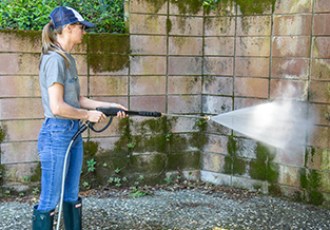BestReviews is reader-supported and may earn an affiliate commission. Details
We recommend these products based on an intensive research process that's designed to cut through the noise and find the top products in this space. Guided by experts, we spend hours looking into the factors that matter, to bring you these selections.

If you’re serious about the health of your lawn, a smart irrigation system might be right for you. Smart irrigation systems utilize a combination of advanced sprinklers and intelligent irrigation controllers to automatically adjust the watering of your lawn to optimal levels. These controllers regulate when and for how long your sprinklers run. When programmed properly, smart irrigation systems can be much more efficient than manual sprinklers.
How are these systems more efficient? For one thing, you can save money. With a smart system, water output automatically adjusts itself based on weather and soil conditions. In turn, this can reduce your water bill. You can also save time with a smart irrigation system. Once the system is set up, you don’t have to spend much time tending to your lawn’s irrigation.
A smart irrigation system is incredibly convenient, as it can adapt to seasonal weather changes with little reprogramming. It’s ideal for complying with any local watering restrictions, and it’s a nice-to-have item for people who frequently travel.

There are two main types of smart irrigation systems: weather-based systems and soil moisture-based systems. The type that’s right for you depends on several factors, including the weather patterns in your area and the landscape of your property.
Weather-based smart irrigation systems, also called ET-based systems, rely on outside data or local weather patterns to make adjustments. These systems include weather sensors that monitor conditions such as temperature, rainfall, and solar radiation. This data may be gathered on your property or from a remote site.
These systems take advantage of three different types of technology: signal-based controllers, historic ET controllers, and on-site weather measurement controllers.
Soil moisture systems use sensors to monitor moisture content in the soil; watering is adjusted accordingly. Many of these sensors can be added to an existing traditional controller. There are two main types of soil sensor-based irrigation systems: suspended cycle irrigation systems and water-on-demand irrigation systems.
Sensors and controllers are the main parts of a smart irrigation system, but other factors should also be considered to make the most out of their benefits. Using water-efficient sprinkler heads and nozzles ensures that the landscape is being treated evenly and there isn’t any excess waste.
It’s also important to consider that not all areas of your property will require the same amount of water. Establishing landscape beds in areas separate from your grass helps to properly segment your area for efficient watering. Experts will agree that zoning is an important aspect to consider for smart irrigation efficiency.

Many modern smart irrigation systems can be controlled remotely from a mobile device. You can download an app for your Android or Apple device or access control via a web browser. These features can be used alongside other systems (like video monitoring) for added convenience.
With the growing popularity of voice-activated devices like Amazon Alexa, it’s no surprise that some companies have added it to their smart irrigation systems. These advanced voice-activated systems not only utilize smart adjustments based on weather, but they also allow users to control their sprinkler systems with easy commands such as “Alexa, turn on my lawn.”
While basic smart systems utilize mobile devices for a more detailed view of settings and data, there are touchscreen controllers put that information directly on the controller screen. These devices work exceptionally well in dark spaces like garages and sheds.

The least-expense smart systems cost roughly $100 to $150. These systems feature the basic components of any smart irrigation system, such as WiFi and mobile phone connectivity. The main factor that keeps costs low for these systems is a simplistic controller interface. These devices don’t usually have touchscreens, and users will likely need an external device to access detailed information.
Mid-level irrigation systems blend basic smart technology, like weather monitoring and wireless connectivity, with advanced technologies like touchscreens and voice control. They tend to pull weather data from more locations to deliver more precise information. These systems may cost anywhere from $150 to $200.
The most expensive smart irrigation systems cost $200 or more. These systems typically offer the most compatibility with other applications. They may be installed on top of current systems to bring a modern touch to traditional systems.


A. According to the EPA, overwatering leads to as many as 4 billion wasted gallons of water each day in the United States. They estimate that an average household saves 15,000 gallons per year with an EPA-certified smart irrigation system, though your actual savings will depend on your climate and your landscaping.
A. Smart irrigation systems vary in complexity. Depending on the setup, installation may require some basic electrical or lawncare knowledge. If you choose to hire someone, make sure they are licensed.
A. Not exactly. Keep in mind that zoning is important. Your smart irrigation system will adjust to the needs of your property, so as long as you organize and zone your property correctly, an irrigation system should adjust accordingly and take care of the rest.
Get emails you’ll love.
Learn about the products you’re wondering if you should buy and get advice on using your latest purchases.
